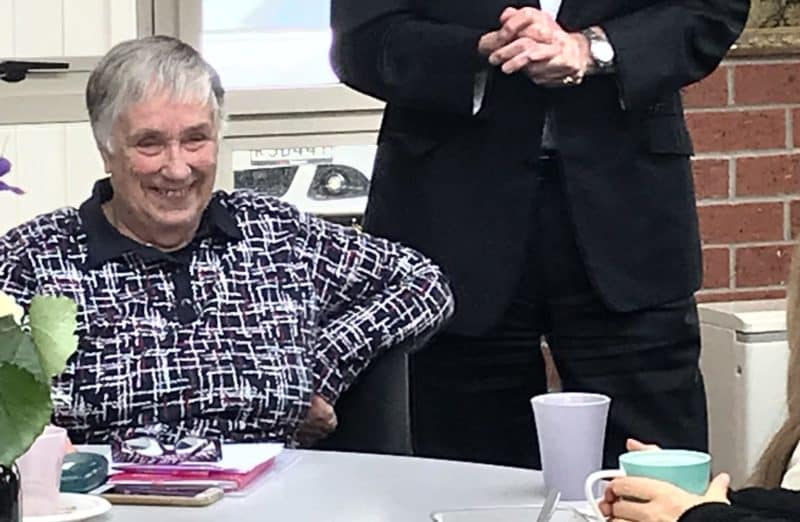Only someone who has served the Church at grass roots level for more thana quarter of a century can lovingly refer to it as a “weird organisation”.

Pat Lythe (left) at her farewell from the
Pompallier Diocesan Centre enjoys a joke from Bishop Patrick Dunn.
Looking back on her role as Auckland Parish and Pastoral Services Group leader just before she retired on October 5, Pat Lythe told NZ Catholic how her role of promoting pastoral councils and helping priests and lay people work together developed over the years from when she first became evangelisation coordinator and Diocesan Pastoral Council (DPC) secretary in 1992.
“There were lots of issues that needed sorting through (at the time) because the Church is a weird organisation. It’s not the same as any other organisation,” she observed.
Back then, people who were working for the Church were doing it “half-volunteer and half-paid”, she said, then adding “poorly”.
“Parish secretaries didn’t have employment contracts at the beginning. And so when parish priests change, and [the new priest] didn’t like the parish secretary, he’d just sack her,” she said. “And they [parish secretaries] have no comeback.”
Mrs Lythe was appointed the first woman chair of the DPC in 1976 by Bishop Reginald Delargey, who first set up the council.
All the Auckland bishops from that time onwards, she said, from Bishop Delargey through to Bishops John Mackey, Denis Browne and Patrick Dunn, supported the creation of parish councils and made them mandatory in the diocese.
“The priests [hadn’t] been used to working with lay people at that time. It’s actually still true now because the priests that have come from overseas are still not used to it. And so it’s gone around in a circle,” she said.
Priests were used to being the ones making the decisions, she said. Getting them to work with lay people was very difficult.
“It took a long time. It’s still difficult. You just have to be patient and work slowly with them,” she said.
That was only a part of her work for the diocese. Mrs Lythe was also involved in evangelisation as well as ecumenism.
One of the biggest disappointments in her work was the pulling out by the New Zealand bishops from the Conference of Churches in Aotearoa New Zealand, which contributed to its demise in 2005.
“There were good reasons that they pulled out, but I was really disappointed that happened,” she said. “We don’t offer one Christian voice to the Government anymore . . . . We lost our leverage both with the Government and the country. If the Christians can’t even work together, what’s the point?” she said.
In 2004, her roles became merged and she became head of the Pastoral and Evangelisation Office which later transformed into the Parish and Pastoral Services Group at Auckland diocese.
Mrs Lythe was witness to how much of an impact secularisation has had on the Church’s life.
“The worst thing that happened, the thing that had the most impact was weekend shopping. The bishops marched down the streets of Wellington to prevent that. But once that happened, Sundays no longer became a day of rest or a day of going to church,” she said.
She said parishes lost the sense of community and people started going to cafes instead of churches on Sundays.
The increased diversity in the Church in Auckland is both a plus and a minus, Mrs Lythe said.
“It’s good to have migrant clergy because half of our congregations are migrant. But it’s a big adjustment for everybody . . . both migrants and Kiwis,” she said.
One of the challenges that diversity has brought is a lack of emphasis on a bicultural Church.
“We are supposed to acknowledge the first place of the Māori people in this country. In fact, there should be some acknowledgement of that in every parish and there isn’t,” she noted. “We actually work very hard to make that an important part of the Church and it’s getting lost.”
Acknowledgement of Māori can be done simply with the sign of the cross or having a Māori image in the church.
“I think we need to be more intentional [about] that when we are talking with,
particularly . . . the new (migrant) clergy,” she said.
Mrs Lythe said the sexual abuse scandal in the Church is “knocking attendance”.
“My hope is that everybody who comes to church on Sunday sees their role as being a missionary disciple,” she said.
She said Mass attendance in Auckland diocese is 37,000 as of the last survey, which is only 20 per cent of those who identified as Catholics in the diocese area after the last census.
“That 37,000, those people, need to be missionary disciples. They need to talk about the Good News and how the faith is really important in their lives and bring those 80 per cent back and show society that Christianity has got something to offer, that following Jesus Christ is important,” she said.
In 2008, Mrs Lythe was created a Dame of the Order of St Gregory the Great by Pope Benedict XVI.

Reader Interactions